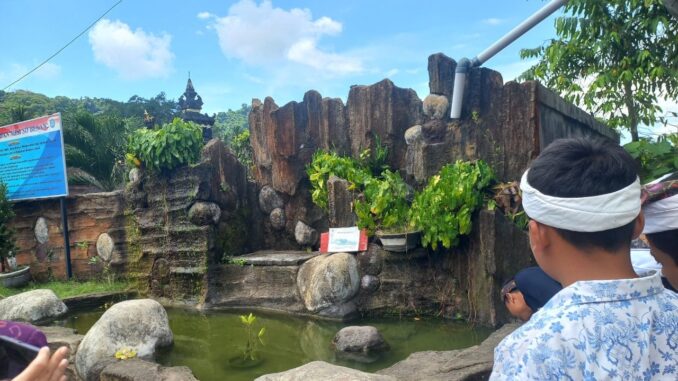
KLUNGKUNG, mybalinews.com – Klungkung – Besan Public Elementary School, Klungkung Regency, has developed an exciting innovation in water conservation efforts through the Tirtanovasi grant program, part of the Bali Water Protection (BWP) initiative run by IDEP Selaras Alam.
This program encourages new school-based ideas with a participatory approach, making schools not only places of learning but also practical spaces for maintaining the sustainability of Bali’s water resources.
One of the most prominent innovations emerged from SDN Besan through the School Rain Garden project, initiated by Osila, a PPPK teacher and the program’s initiator.
The idea arose from concern over the condition of Besan, her childhood village, which is now experiencing river drought.
“We used to play in the river after school, but since I returned in 2012, the rivers here have become increasingly dry. Previously, the water flowed year-round because Besan is known for its many springs,” said Osila.
Her return to the village in 2024 coincided with the rainy season. Seeing numerous puddles around the public baths, Osila, along with IDEP Selaras Alam, sought a solution to prevent rainwater from being wasted.
From these discussions, the idea for a School Rain Garden emerged, an integrated system for collecting, filtering, and utilizing rainwater.
“Infiltration wells are nothing new, but we wanted to create a more vibrant and educational version. So we designed a rain garden that could collect water in a pond, which could then be used for watering plants, mopping, and other purposes. Besides conservation, we also saved clean water,” she explained.
The School Rain Garden’s system is simple yet effective. Rainwater flows from the roof tiles to the gutters, then is collected in a reservoir. When the reservoir is full, the water is channeled to the rain garden area to infiltrate into the ground.
This innovation combines several water conservation systems in one integrated process. As a result, the school has recorded a 50% increase in clean water use compared to before the project began.
In addition to being an environmental solution, the rain garden also serves as a learning space for students. Children are encouraged to cultivate and plant local plants such as kluwek, candlenut, and gayam trees. This activity not only enriches local biodiversity but also instills environmental conservation values from an early age.
Despite the challenges of caring for the seedlings, the students’ enthusiasm remains high. Now, the rain garden has become a favorite playground and learning space at the school. The principal of SDN 2 Besan, Wayan Yudiartana, stated that the program’s primary goal is education.
“Our primary goal is to educate the children. We want them to learn not only from books, but also from their surroundings,” he said.
According to Osila, water conservation education is crucial for broadening children’s understanding of the water cycle, not just about conserving water.
“Children need to know that water can be recycled and reused. In cities, water catchment areas are dwindling, and this is a major challenge for all of us. The government also needs to start taking Bali’s water situation more seriously,” he said.
Through the School Rain Garden innovation, SDN 2 Besan demonstrates that caring for water can start with small steps within the school environment.
By collaborating with IDEP Selaras Alam, this school has successfully demonstrated that community-based innovation can provide real solutions for the future of water in Bali.
Through the Tirtanovasi competition, held in 2024, IDEP Selaras Alam invited schools in Bali to innovate in water conservation efforts.
The competition was designed with a bottom-up approach, positioning schools not as beneficiaries, but as subjects and agents of change in solving environmental problems.
“This competition uses an approach that views the community not as objects receiving benefits, but as subjects and agents of change in solving public problems. We believe that communities are capable of generating local innovations and solutions from, by, and for the community. This is not intended to replace the role of the state, but to accelerate problem-solving by demonstrating the potential of community-based innovation,” said Muchamad Awal, Executive Director of IDEP Selaras Alam. (rls)





Be the first to comment